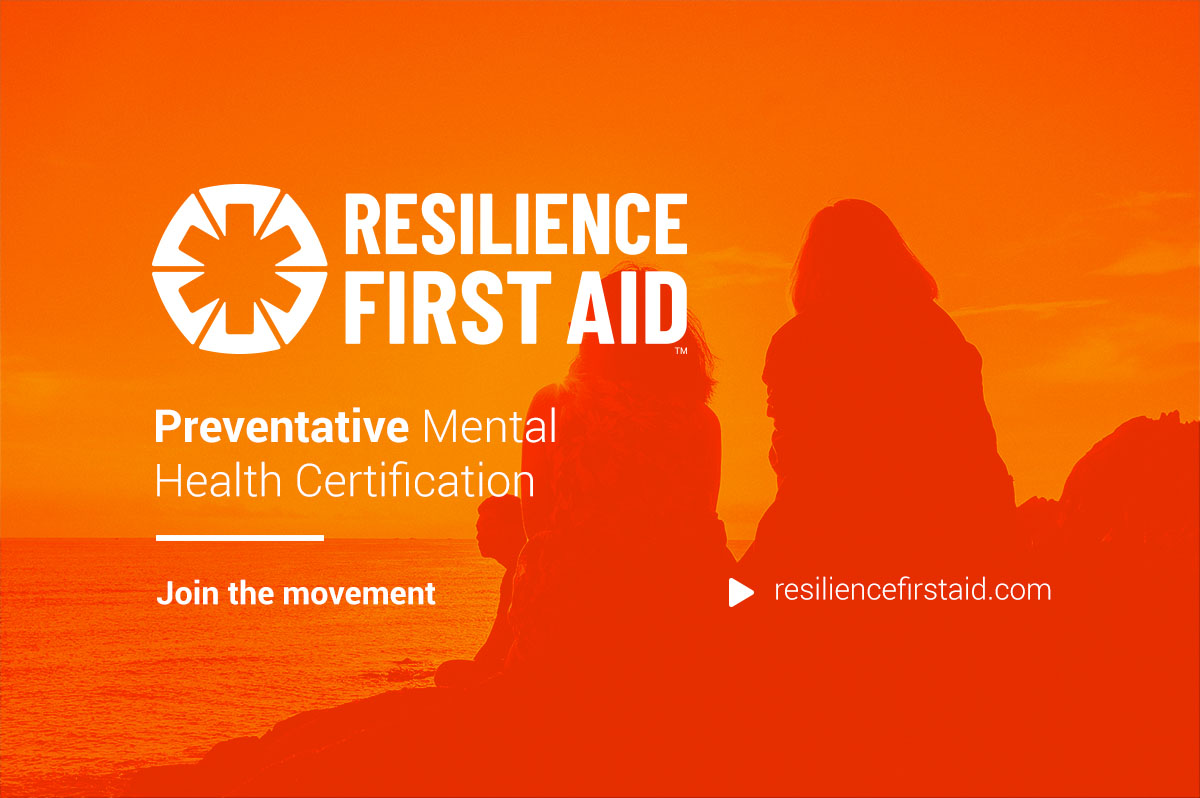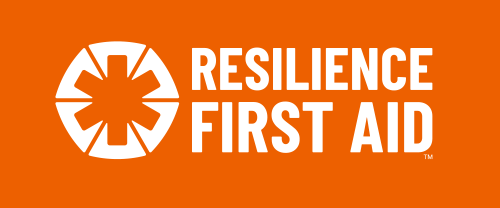Why Resilience First Aid?
Why Resilience First Aid?
A Preventative Approach
Resilience First Aid training helps people proactively build wellness in others as a preventative approach for mental health.

Our collective challenge
The reality is that people are struggling more then ever with mental health. Over the last 15 years, there’s been a steady increase in suicide rates. In 2020 alone, calls to suicide helplines increased by 20%.
Most efforts are focused on helping those who are struggling. However, for us to make a real impact on reducing depression and suicide rates, we need to start much earlier.
THE OVERWHELMING CASE FOR PROACTIVE MENTAL HEALTH
There is an old story about a man who discovers someone drowning in a nearby river.
As soon as the man sees the person, he kicks off his shoes and dives in. He struggles to pull them all the way to the bank of the river, but they make it. He collapses, exhausted.
The man hears a shout – and sees another person drowning in the same river! Though his energy is spent, he musters his willpower and dives in, saving the second person.
While lying on the bank, he sees yet another third person drowning in the river! The man is utterly depleted, but he can’t let that person drown – so again, he dives in. With his energy used up, the man doesn’t make it out of the river, and neither does the third person.
However, if the man were to walk up the river a short way, he would have discovered a damaged rope bridge where people are falling into the river.
This old story has an important, enduring point:
Addressing symptoms is compassionate, but addressing causes is the most effective way to help.
Consider the case of mental health. Even prior to the COVID, indicators of mental distress was already on the rise, especially in young adults.
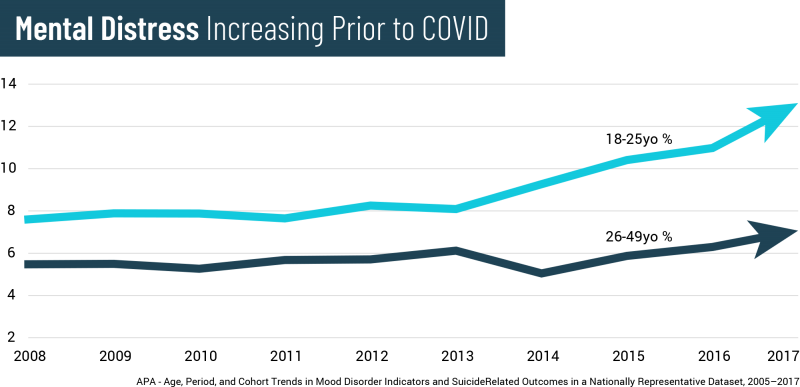
COVID DRAMATICALLY INCREASED THE NEED
While mental health issues were already on the rise prior to COVID, the pandemic itself is taking a major toll on our collective mental health.
Throughout 2020, most countries saw a more than two-fold increase in the percentage of the population that experienced symptoms of depression anxiety.
This increase has placed a huge load on healthcare systems and the availability of therapy. In particular, it has made very clear how far behind we are in our preventative efforts to prepare and support each other to maintain good mental health.
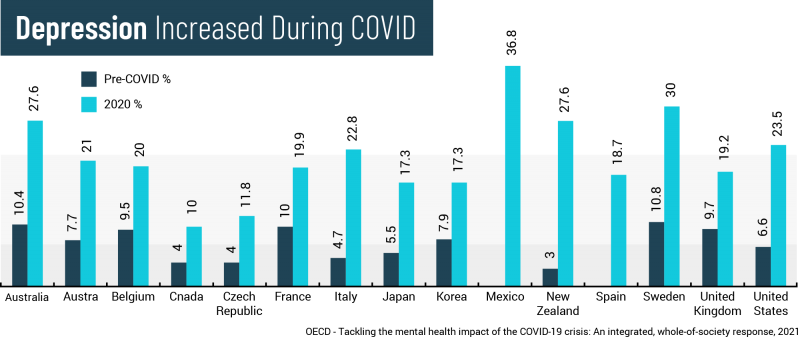
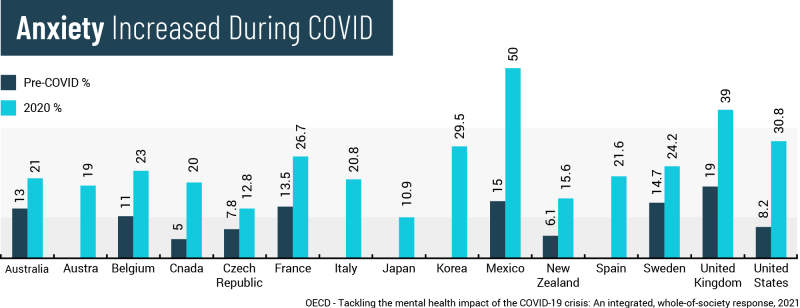
CLOSING THE GAP
Treatment, on its own, can’t do enough to address the entire burden of mental ill health.[1] This is because there can often be a gap between when mental illness starts and when the person begins looking for help. As well as this, treatment might not be accessible or adequate – for example, the closest therapist may still be too far away or too expensive, or it might take many months before getting access.
People may also not realise that what they’re going through can be helped, or that it isn’t normal. They may think everyone feels like they do – or even that it’s their fault, so they shouldn’t reach out or get treatment.
In fact, research shows that at least 60% of people with a mental health concern don’t seek help.[2] This is called the “treatment gap” – the amount of people with a mental health concern compared to the amount of people getting help for it. This gap is usually because of one of four factors:
- They don’t know what mental health concerns looks like, so don’t realise they have anything that needs treatment
- They aren’t aware of how to access treatment
- They negatively stereotype mental illness
- They expect that others will negatively stereotype them
A remarkable quality about human beings is our adaptability. We are able to adapt to nearly any circumstance. However, this may mean that we adapt to a level of emotional suffering that could be avoided or changed – and not even realise how bad it is until things get better. It’s like someone with poor eyesight wearing glasses for the first time – they never realised that the world could be so clear. They never knew everyone else could see individual leaves on trees. Proactive mental health helps us check in with each other and ourselves, helping us take action earlier.
Many people who avoid treatment for all the reasons above may seek their own solutions, often without realising. Consider the worn-out mother who has several glasses of wine every night to “relax”, or the over-worked man who stays up every night gaming, or the boss who takes out his stress on his employees. Others may overeat or use substances. Everyone has coping mechanisms, but they may not always be the most beneficial ones – they may even make the situation worse.
The mental health crisis desperately needs solutions that address causes proactively.

PROACTIVE MENTAL HEALTH
Solutions to the crisis must help prevent people from falling into the river, instead of pulling them out after they start drowning – or, at the very least, give them a pair of floaties as they cross the bridge of life.
A paradigm-shifting solution is proactive mental health.
Proactive mental health builds personal capacity that can help an individual avoid various mental health problems. It can also identify issues much earlier and prevent costs to the individual, the community, and society at large. Proactive mental health is more affordable and accessible, and comes with more benefits than reactive mental illness treatment.
WHY IT JUST MAKES SENSE
Taking care of mental health proactively can prevent all this before it even happens. On top of preventing any harm from mental ill health, taking a proactive approach eases the financial burdens that are associated with it. This is because it removes the cost of treatment as well as the loss of productivity related to the onset of the illness.
Mental illness cost America $163 billion in 2013, and the global cost of mental illness has been predicted to triple by 2030. In Australia, the mental health crisis costs somewhere between $43 billion and $51 billion per year, while a further $130 billion is the cost of the loss in productivity due to the mental health issues.
On the other hand, the potential return on investment into proactive mental health is enormous.
83
83x ROI
A study found up to 83 times the return on investment for proactive mental health in children & young people
$2.3
$2.30 for every $1
A study on the workplace found a return of AU$2.30 for every $1 spent on proactive treatment
$4
$4 for every $1
Another found a global average of US$4 per every $1 average – a “no brainer” investment on an economic level
HELPING PEOPLE CONNECT
Being proactive about mental health also helps to prevent people from avoiding reactive treatment due to stigma. People may worry about encountering stigma if they reach out for help. In fact, one survey found that 74% of people who lived with a mental health concern had struggled with stigma at some point – and that it was often the stigma that people held towards themselves that was the largest barrier.
50% of people will experience a period of mental illness in their life, but only two thirds will feel confident to talk about it with someone they trust. According to reports, people who perceive themselves as having more social support are more likely to talk about their mental health, while people who feel that their support networks are weak are less likely. As well as this, studies suggest that improving knowledge about mental health can help reduce stigma and improve mental wellbeing.
Proactive and preventative care involves:
- Training on a strength-based system that can be used in everyday situations
- Creating a shared language for people to discuss their experiences more easily with each other
- And building strong and inclusive support networks
All this helps to build broader society where we can start to reverse the trend of mental illness by caring for each other proactively.
A new approach

When we care earlier for the mental wellbeing of our friends, family, and colleagues, we can start to shift this global trend. This means we bring forward mental health intervention and we focus on building strengths in ourselves and each other – protective factors that prevent depression and mental illness through improved resilience and wellbeing.
This is proactive mental health.
How we’ll do it together

We need people around the world to take up this challenge and become responders. This means:
- Responding to the need for proactive mental health
- Responding when someone needs help
- Responding to raise awareness about what protects mental health
Resilience First Aid teaches these skills.


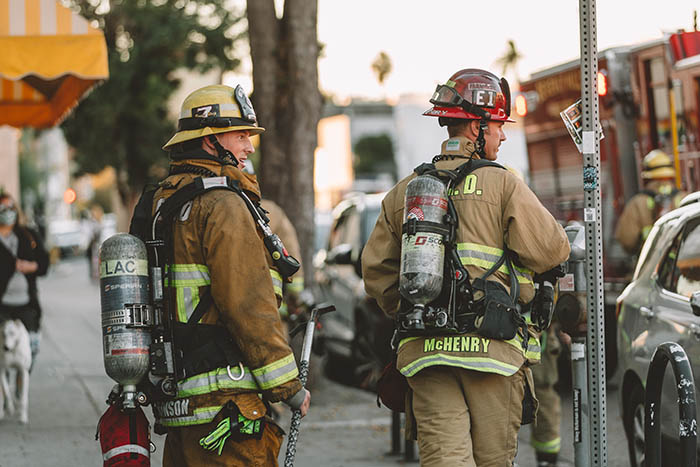
GET CERTIFIED
Talks & Keynotes
We’ll be hosting talks and speaking events. Both in person and online to spread the word. Want to host us? Get in touch!
Awareness materials
We’re creating new materials and content to help raise awareness for proactive mental health. Watch this space!
Public awareness
Shifting our focus to care for each other proactively will take all of us to achieve. Get in touch if you want to help!
